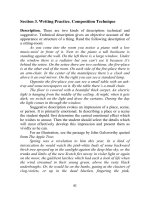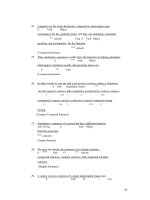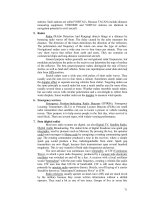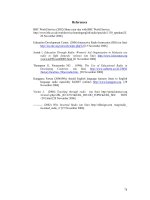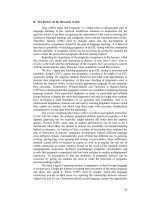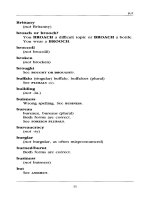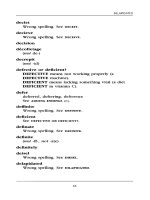Tài liệu Common erros in English part 5 pptx
Bạn đang xem bản rút gọn của tài liệu. Xem và tải ngay bản đầy đủ của tài liệu tại đây (391.43 KB, 15 trang )
COMMAS
(a)
A
comma should never divide
a
subject
from
its
verb.
The two go
together:
My
parents,
had
very strict views.
My
parents
had
very strict views.
Take
extra care with compound
subjects:
The
grandparents,
the
parents,
and the
children,
were
in
some ways
to
blame.
The
grandparents,
the
parents,
and the
children
were
in
some ways
to
blame.
(b)
Commas should never
be
used
in an
attempt
to
string sentences together. Sentences must
be
either properly joined (and commas
don't
have
this
function)
or
clearly separated
by
full
stops,
question marks
or
exclamation marks.
Commas
have certain very
specific
jobs
to do
within
a
sentence.
Let us
look
at
each
in
turn:
(i)
Commas separate items
in a
list:
I
bought apples, pears,
and
grapes.
She
washed
up,
made
the
beds,
and had
breakfast.
The
novel
is
funny,
touching,
and
beautifully
written.
The final
comma before
'and'
in a
list
is
optional. However,
use it to
avoid
any
ambiguity.
See
(ix)
below.
(ii)
Commas
are
used
to
separate terms
of
address
from
the
rest
of the
sentence:
Sheila,
how
nice
to see
you!
Can
I
help you, madam?
I
apologise, ladies
and
gentlemen,
for
this delay.
Note
that
a
pair
of
commas
is
needed
in the
last
example above because
the
term
of
address
50
COMMAS
occurs
mid-sentence.
It is a
very
common
error
to
omit
one of the
commas.
(iii)
Commas
are
used
to
separate interjections, asides
and
sentence tags like isn't
it?
don't
you?
haven't
you?.
You'll notice
in the
examples below that
all
these additions could
be
removed
and
these
sentences would still
be
grammatically sound:
My
mother, despite
her
good intentions, soon
stopped going
to the
gym.
Of
course, I'll help
you
when
I
can.
You've
met
Tom, haven't
you?
(iv)
Commas
are
used
to
mark
off
phrases
in
apposition:
Prince Charles,
the
future
king,
has an
older
sister.
The
phrase
'the
future
king'
is
another
way of
referring
to
'Prince
Charles'
and is
punctuated
just
like
an
aside.
(v)
A
comma separates
any
material that precedes
it
from
the
main part
of the
sentence:
Although
she
admired him,
she
would never
go
out
with him.
If
you
want
to
read
the
full
story,
buy The
Sunday Times.
Note
that
if the
sentences
are
reversed
so
that
the
main part
of the
sentence comes
first, the
comma becomes optional.
(vi)
Commas mark
off
participles
and
participial
phrases, whenever they come
in the
sentence:
Laughing
gaily,
she ran out of the
room.
He
flung
himself
on the
sofa,
overcome with
remorse.
The
children, whispering excitedly, crowded
51
COMMAS
through
the
door.
For a
definition
of
participles
see
PARTICIPLES.
(vii)
Commas mark
off
some
adjectival
clauses. Don't
worry
too
much about
the
grammatical
terminology here. You'll
be
able
to
decide
whether
you
need
to
mark them
off in
your
own
work
by
matching them against these
examples.
Can
you see the
difference
in
meaning that
a
pair
of
commas makes here?
Read
the two
sentences aloud, pausing where
the
commas
indicate that
you
should pause
in the first
sentence,
and the two
different
meanings should
become clear:
The
firemen, who
wore
protective clothing,
were
uninjured.
(=
nobody
injured)
The
firemen who
wore protective clothing were
uninjured,
(but those
who
didn't wear
it )
(viii)
Commas
are
used
to
mark
a
pause
at a
suitable
point
in a
long sentence. This will
be
very much
a
question
of
style. Read your
own
work
carefully
and
decide exactly
how you
want
it to
be
read.
(ix)
Commas
are
sometimes
needed
to
clarify
meaning.
In the
examples below,
be
aware
how
the
reader could initially make
an
inappropriate
connection:
She
reversed
the car
into
the
main road
and my
brother waved goodbye.
She
reversed
the car
into
the
main road
and my
brother??
She
reversed
the car
into
the
main road,
and my
brother waved goodbye.
52
COMPARATIVE
AND
SUPERLATIVE
In
the
skies above
the
stars glittered palely.
In the
skies above
the
stars??
In
the
skies above,
the
stars
glittered
palely.
Notice
how the
comma
can
sometimes
be
essential with
'and'
in a
list:
We
shopped
at
Moores, Browns,
SuperValu,
Marks
and
Spencer
and
Leonards.
Is
the
fourth shop called
Marks,
or
Marks
and
Spencer?
Is
the fifth
shop called Leonards,
or
Spencer
and
Leonards?
A
comma makes
all
clear:
We
shopped
at
Moores, Browns,
Super
Valu,
Marks
and
Spencer,
and
Leonards.
commemorate
(not
-m-)
comming
Wrong spelling.
See
COMING.
commission
(not
-m-)
commit
committed, committing, commitment
See
ADDING ENDINGS
(iv).
committee
common nouns
See
NOUNS.
comparative
comparatively
(not
compari-)
comparative
and
superlative
(i)
Use the
comparative
form
of
adjectives
and
adverbs when comparing
two:
53
COMPARATIVE
AND
SUPERLATIVE
John
is
TALLER
than Tom.
John works
MORE
ENERGETICALLY
than Tom.
Use
the
superlative
form
when comparing three
or
more:
John
is the
TALLEST
of all the
engineers.
John works
THE
MOST
ENERGETICALLY
of all
the
engineers.
(ii)
There
are two
ways
of
forming
the
comparative
and
superlative
of
adjectives:
(a)
Add -er and
-est
to
short
adjectives:
tall
taller tallest
happy happier happiest
(b)
Use
more
and
most with longer adjectives:
dangerous more dangerous most dangerous
successful
more
successful
most
successful
The
comparative
and
superlative
forms
of
adverbs
are
formed
in
exactly
the
same way:
(c)
Short adverbs
add -er and
-est.
You
run
FASTER
than
I do.
He
runs
the
FASTEST
of us
all.
(d)
Use
more
and
most with longer adverbs.
Nikki
works
MORE
CONSCIENTIOUSLY
than
Sarah.
Niamh
works
THE
MOST
CONSCIENTIOUSLY
of
them all.
(iii)
There
are
three irregular adjectives:
good better best
bad
worse worst
many
more most
There
are
four
irregular adverbs:
54
COMPLEMENT
OR
COMPLIMENT?
(iv)
A
very common error
is to mix the two
methods
of
forming
the
comparative
and the
superlative:
more
simpler
most easiest
(v)
Another pitfall
is to try to
form
the
comparative
and
superlative
of
absolute words like perfect,
unique, excellent, complete, ideal. Something is
either perfect
or it
isn't.
It
can't
be
more perfect
or
less perfect, most perfect
or
least perfect.
compare
to/compare with
Both
constructions
are
acceptable
but
many
people
still prefer
to use
'compare
with'.
comparitive
Wrong spelling.
See
COMPARATIVE.
competition
competitive, competitively
complacent
or
complaisant?
COMPLACENT
=
smug,
self-satisfied
COMPLAISANT
=
obliging, willing
to
comply
compleatly
Wrong spelling.
See
COMPLETELY.
complement
or
compliment?
COMPLEMENT
=
that which completes
Half
the
ship's
COMPLEMENT
were recruited
in
Norway.
To
COMPLEMENT
-
to go
well with something
Her
outfit
was
COMPLEMENTED
by
well-chosen
accessories.
COMPLIMENT
=
praise, flattering remarks
55
well
badly
much
little
better
worse
more
less
best
worst
most
least
simpler
easiest
To
COMPLIMENT
= to
praise
complementary
or
complimentary?
Use
COMPLEMENTARY
in the
sense
of
completing
a
whole:
COMPLEMENTARY
medicine
COMPLEMENTARY
jobs
Use
COMPLIMENTARY
in two
senses:
(a)
flattering
(b)
free
of
charge
COMPLIMENTARY
remarks
COMPLIMENTARY
tickets
completely
complete
+
ly
(not
completly, completley
or
compleatly)
See
ADDING ENDINGS
(ii).
complex
or
complicated?
Both
words mean
'made
up of
many
different
intricate
and
confusing aspects'. However,
use
COMPLEX
when
you
mean
'intricate',
and
COMPLICATED
when
you
mean
'difficult
to
understand'.
compliment
See
COMPLEMENT
OR
COMPLIMENT?.
compose/comprise
The
report
IS
COMPOSED
OF ten
sections.
(=
is
made
up of)
The
report
COMPRISES
ten
sections.
(=
contains)
Never
use the
construction
'is
comprised
of. It is
always
incorrect grammatically.
comprise
(not
-ize)
56
COMPLEMENTARY
OR
COMPLIMENTARY?
CONSISTENT
compromise
(not
-ize)
computer
(not
-or)
concede
conceive
conceived, conceiving, conceivable
See
EI/IE
SPELLING RULE.
concise
confer
conferred,
conferring, conference
See
ADDING ENDINGS
(iv).
confidant,
confidante
or
confident?
A
CONFIDANT (male
or
female)
or a
CONFIDANTE
(female
only)
is
someone
to
whom
one
tells
one's
secrets
'in
confidence'.
CONFIDENT
means assured.
connection
or
connexion?
Both
spellings
are
correct,
but the first one is
more
commonly used.
connoisseur
Used
for
both
men and
women.
conscientious
consist
in or
consist
of?
For
Belloc, happiness CONSISTED
IN
'laughter
and
the
love
of
friends',
(consist
in =
have
as its
essence)
Lunch
CONSISTED
OF
bread, cheese
and
fruit.
consistent
(not
-ant)
57
CONSONANT
consonant
There
are 21
consonants
in the
alphabet,
all the
letters except
for the
vowels:
bcdfghjklmnpqrstvwxyz
Note,
however,
that
y can be
both
a
vowel
and a
consonant:
y
is a
consonant when
it
begins
a
word
or a
syllable
(yolk,
beyond);
y
is a
vowel when
it
sounds like
i or e
(sly, baby).
contagious
or
infectious?
Both
refer
to
diseases passed
to
others.
Strictly
speaking,
CONTAGIOUS
means passed
by
bodily contact,
and
INFECTIOUS
means passed
by
means
of air or
water.
Used
figuratively, the
terms
are
interchangeable:
INFECTIOUS
laughter,
CONTAGIOUS
enthusiasm.
contemporary
(not
contempory,
as
often
mispronounced)
Nowadays,
this word
is
used
in two
senses:
(a)
happening
or
living
at the
same time
(in the
past)
(b)
modern, current
Be
aware
of
possible ambiguity
if
both these
meanings
are
possible
in a
given context:
Hamlet
is
being performed
in
contemporary
dress,
(sixteenth-century
or
modern?)
contemptible
or
contemptuous
A
person
or an
action worthy
of
contempt
is
CONTEMPTIBLE.
A
person
who
shows contempt
is
CONTEMPTUOUS.
continual
continually
58
CORPORAL
PUNISHMENT
continual
or
continuous?
CONTINUAL
means
frequently
repeated, occurring
with short breaks only.
CONTINUOUS
means uninterrupted.
contractions
Take
care when placing
the
apostrophe
in
contractions.
It is
placed where
the
letter
has
been
omitted
and not
where
the two
words
are
joined.
These happen
to
coincide
in
some contractions:
I'd (I
would,
I
had)
they aren't (they
are
not)
it
isn't
(it is
not)
you
hadn't
(you
had
not)
you
wouldn't
(you
would
not)
she
won't
(she
will
not)
we
haven't
(we
have
not)
I
shan't
(I
shall
not)
It
was
common
in
Jane
Austen's
time
to use two
apostrophes
in
shan't
(sha'n't)
to
show that
two
sets
of
letters
had
been omitted
but
this
is no
longer
correct today.
control
controlled, controlling
controller
convenience
(not
-ance)
convenient
conveniently
(not
convien-)
cord
See
CHORD
OR
CORD?.
corporal punishment
See
CAPITAL
OR
CORPORAL
PUBLISHMENT?.
59
(not -or)
CORRESPOND
correspond
(not
-r-)
correspondence
(not
-ance)
correspondent
or
co-respondent?
A
CORRESPONDENT
is
someone
who
writes
letters.
A
CO-RESPONDENT
is
cited
in
divorce proceedings.
could
of
This
is
incorrect
and
arises
from
an
attempt
to
write
down
what
is
heard. Write
'could've'
in
informal
contexts
and
'could
have'
in
formal ones.
I
COULD'VE
given
you a
lift.
I
COULD
HAVE
given
you a
lift.
Beware
also: should of/would
of/must
of/might
of.
All
are
incorrect
forms.
couldn't
See
CONTRACTIONS.
council
or
counsel?
A
COUNCIL
is a
board
of
elected
representatives.
COUNSEL
is
advice, also
the
term used
for a
barrister representing
a
client
in
court.
councillor
or
counsellor?
A
COUNCILLOR
is an
elected representative.
A
COUNSELLOR
is one who
gives professional
guidance,
such
as a
study
COUNSELLOR,
a
marriage
COUNSELLOR,
a
debt
COUNSELLOR.
counterfeit
This
is one of the few
exceptions
to the
IE/El
spelling rule.
See
IE/El
SPELLING
RULE.
60
CRYSTAL
courageous
(not
-gous)
See
SOFT
c
AND
SOFT
G.
course
See
COARSE
OR
COURSE?.
courteous
courteously, courtesy
credible
or
credulous?
If
something
is
CREDIBLE,
it is
believable.
If
someone
is
CREDULOUS,
he or she is
gullible
(i.e.
too
easily taken
in).
crisis
(singular) crises (plural)
See
FOREIGN PLURALS.
criterion
(singular) criteria (plural)
See
FOREIGN PLURALS.
criticise/criticize
Both spellings
are
correct.
criticism
This
word
is
frequently
misspelt.
Remember critic
+
ism.
cronic
Wrong spelling.
See
CHRONIC.
crucial
cry
cried, crying
See
ADDING ENDINGS
(iii).
crysanthemum
Wrong spelling.
See
CHRYSANTHEMUM.
crystal
(not
chr-)
61
CUPBOARD
cupboard
(not
cub-)
curb
or
kerb
To
CURB
one's
temper
means
to
control
or
restrain
it.
A
CURB
is a
restraint
(e.g.
a
curb
bit for a
horse).
A
KERB
is the
edging
of a
pavement.
curious
curiosity
(not
-ious-)
curly
(not
-ey)
currant
or
current?
A
CURRANT
is a
small dried grape used
in
cooking.
A
CURRENT
is a
steady
flow of
water,
air or
electricity.
CURRENT
can
also
mean
happening
at the
present
time
(as in
CURRENT
affairs,
CURRENT
practice).
curriculum
(singular) curriculums/curricula (plural)
See
FOREIGN
PLURALS.
curriculum vitae
(abbreviation:
CV)
curtain
See
CERTAIN
OR
CURTAIN?.
62
daily
(not
dayly)
This
is an
exception
to the -y
rule.
See
ADDING ENDINGS (iii).
dairy
or
diary?
We buy our
cream
at a
local
DAIRY.
Kate
writes
in her
DIARY
every
day.
dangling participles
See
PARTICIPLES.
dashes
Dashes
are
used widely
in
informal notes
and
letters.
(i)
A
dash
can be
used
to
attach
an
afterthought:
I
should love
to
come
-
that's
if I can get the
time off.
(ii)
A
dash
can
replace
a
colon before
a
list
in
informal
writing:
The
thieves took everything
-
video, television,
cassettes, computer, camera,
the
lot.
(iii)
A
dash
can
precede
a
summary:
Video,
television, cassettes, computer, camera
-
the
thieves took
the
lot.
(iv)
A
pair
of
dashes
can be
used like
a
pair
of
commas
or a
pair
of
brackets around
a
parenthesis:
Geraldine
is - as you
know
-
very
shy
with
strangers.
(v)
A
dash
can
mark
a
pause before
the
climax
is
reached:
There
he was at the
foot
of the
stairs
-
dead.
63
D
t
DATA
(vi)
Dashes
can
indicate hesitation
in
speech:
I
- er -
don't
-
um
-
know what
-
what
to
say.
(vii)
Dashes
can
indicate
missing letters
or
even
missing
words where propriety
or
discretion
require
it:
c
1
(ship
of the
desert)
Susan
L—
comes
from
Exeter.
He
swore
softly,
'
it'.
data
(plural) datum (singular)
Strictly
speaking,
DATA
should
be
used with
a
plural
verb:
The
DATA
have been collected
by
research students.
You
will, however, increasingly
see
DATA
used with
a
singular verb
and
this
use has now
become
acceptable.
The
DATA
has
been collected
by
research students.
dates
See
NUMBERS
for a
discussion
of how to set out
dates.
deceased
or
diseased?
DECEASED
means dead.
DISEASED
means
affected
by
illness
or
infection.
deceit
(not
-ie)
See
EI/IE
SPELLING
RULE.
deceive
decent
or
descent?
DECENT
means
fair,
upright, reasonable.
DESCENT
means
act of
coming down, ancestry.
decide
decided, deciding (not decied-)
64
